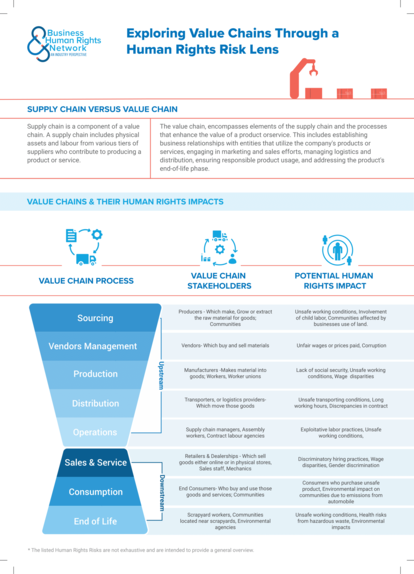Bussiness Human Rights
Navigating Compliance & Sustainability: SMEs in Global Value Chains
In the ever-evolving landscape of global commerce, the intricate web of global value chains stands as a cornerstone. These chains encapsulate every facet of a product or service's journey, spanning from its inception to its utilization and beyond. Local entities, often small and medium-sized enterprises (SMEs), find themselves deeply intertwined with larger foreign enterprises, engaging in supply and subcontracting. For developing economies, integration into these value chains has been instrumental in accelerating economic progress and in meeting development priorities.
However, these global value chains extend beyond borders, presenting environmental and human rights challenges. The diagram below provides a simplified overview of stakeholders and potential human rights impacts within these interconnected chains.

Business and Human Rights
© CRBAside from the human rights considerations, SMEs encounter a plethora of hurdles within global value chains. These challenges include limited access to financing, a shortage of skilled labor, insufficient institutional support, and heightened compliance requirements. Particularly in regions like Germany (Lieferkettengesetz) and the European Union (Corporate Sustainable Due Diligence Directive), impending legislations pose significant obstacles for SMEs. Given their constrained resources, SMEs find it challenging to identify, address, and rectify these issues. Reports from organizations like Sweden's National Board of Trade highlight the difficulties suppliers face in meeting the rigorous due diligence standards set by EU companies, potentially resulting in severed ties or exclusion from the lucrative EU market.
Against this backdrop, the Business and Human Rights Network, in collaboration with FNF South Asia and the Centre for Responsible Business, conducted a webinar titled “Global Sustainable Value Chains: Prospects and Obstacles for South Asian SMEs”.
The opening remarks by Rijit Sengupta, Chief Executive Officer at the Centre for Responsible Business, underscored the convergence of agendas between the UN Forum on Business and Human Rights in Geneva and the Paris climate community. He advocated for collaboration between the Global North and South, acknowledging India's strides in responsible business practices.
The keynote address delivered by Carl-Julius Cronenberg, Member of Parliament, Germany, highlighted India's growing significance and the opportunities for small and medium-sized companies in diversifying supply chains. He also acknowledged sustainability as a competitive advantage in European markets, expressing concerns about potential bureaucratic hurdles due to stringent regulations. He urged for balanced regulation without hampering trade relationships and encouraged discussions for mutual growth and development between Germany and India.
Special remarks by Pradeep Ramakrishnan, General Manager at Securities and Exchange Board of India (SEBI), highlighted India's robust regulatory framework for Environmental, Social, and Governance (ESG) factors, focusing on non-financial disclosures and initiatives contributing to India’s leadership in Corporate Governance. He also mentioned BRSR and BRSR Core as credible information sources for stakeholders.
The panel discussion included Nusrat Khan, BHR Specialist, UNDP India; Mr. Anil Bharadwaj, Federation of Indian Micro and Small & Medium Enterprises (FISME), India; Mr. Shiham Marikar, SG, National Chamber of Exporters (NCE), Sri Lanka and was moderated by Nandini Sharma, Director, Centre for Responsible Business .[p1]
Here are key points covered by the panel:
- SME Significance: Acknowledged the vital role of SMEs in the economy but stressed the need for education on ethical trading and regulatory compliance.
- Challenges Faced: Noted hurdles like compliance costs, unclear regulations, and uncertainties, especially during events like the COVID-19 pandemic.
- Clarity and Capacity Building: Emphasized the necessity for clear laws, capacity building, and awareness to assist SMEs in understanding and complying with evolving regulations, particularly in the Global South.
- Role of Larger Brands: Urged larger companies to set positive standards that influence SMEs in their supply chains, emphasizing buyer responsibility.
- Legislative Reforms: Highlighted the importance of clear laws, robust execution, and updating outdated labour and environmental regulations.
- Incentivizing Compliance: Proposed incentivizing SMEs to adhere to ethical standards for better compliance, not just relying on penalties.
- Sustainable Business Models: Encouraged a shift to sustainable business models beyond profit-centric approaches.
- Continual Dialogue: Emphasized the need for ongoing discussions involving stakeholders for effective solutions.
In conclusion, SMEs play a pivotal role in global value chains, offering both vast opportunities and risks. Addressing these risks and challenges requires a collective effort from policymakers, industry stakeholders, and SMEs themselves. Empowering SMEs to overcome these hurdles will not only fortify their growth but also contribute to the sustainable and inclusive development of global economies.
[p1]Keep the same format…if you are mentioning designation and org name then do it for all; if only org then maintain that. Also, please use fullforms…people may not know FISME and NCE